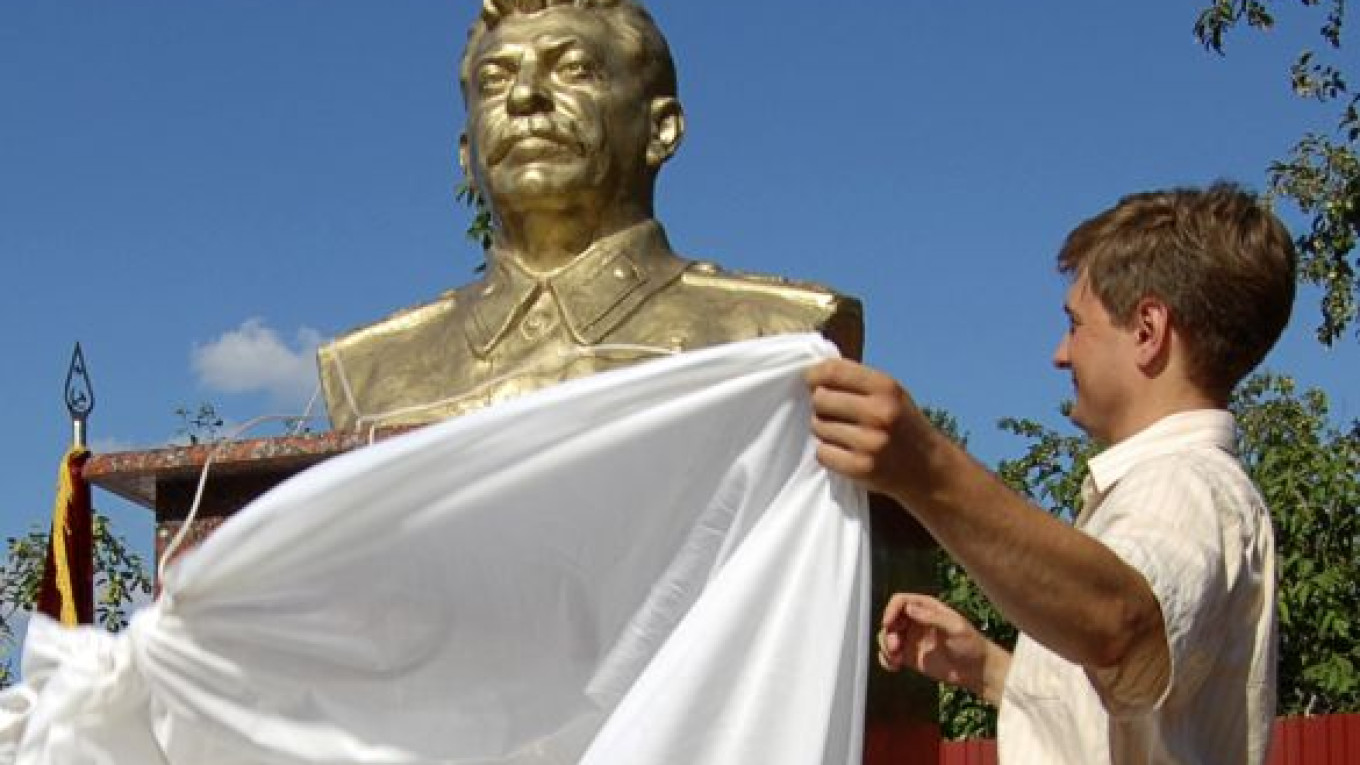Defying the Kremlin's de-Stalinization policy, Communists in the Penza region have unveiled a monument to the Soviet dictator.
About 60 people, many of them World War II veterans, gathered Friday on the grounds of the local office of the Communist Party for the unveiling of the bust.
"A year ago, the veterans came to us with a request to restore historical justice and give them the opportunity to lay flowers at a monument to the generalissimo," Vladimir Simagin, secretary of the local branch, said by phone from Penza.
Stalin is still widely regarded among veterans as a military genius who won the war with the Nazis. A recent survey by the independent Levada Center indicated that half of Russians saw Stalin's leadership as positive for the country.
Simagin said the bust cost 200,000 rubles ($7,100), which was raised through numerous donations from local residents, and was ordered from a sculptor in North Ossetia.
He said the monument is the city's first to Stalin since statues to him were pulled down during the late 1950s following Soviet leader Nikita Khrushchev's condemnation of him and his policies. Stalin died in 1953.
Boris Belenkin, a spokesman for Memorial, Russia's biggest human rights group, said the new monument posed a challenge to both public dignity and the Kremlin's policy of de-Stalinization.
Last October, the head of the presidential human rights council, Mikhail Fedotov, said a priority for him would be to rid Russia of its Stalin-era heritage of oppression and neglect of individual rights.
President Dmitry Medvedev and Prime Minister Vladimir Putin have joined human rights activists in condemning Stalin for his purges.
But it is not up to the Kremlin but municipal authorities to decide whether to allow the Stalin monument on their soil. In Penza, local officials said they did not see any problem with the bust.
"What's wrong with the monument?" a spokesman for the city administration, Lilia Korabelshikova, said by phone.
She said the monument did not violate any law and noted that it stood on the grounds of a compound owned by the Communist Party.
Several attempts have been made to raise monuments to Stalin over the years. In 2006, admirers of the dictator raised a monument for about an hour, but police removed it on orders from local authorities.
Two monuments to Stalin have stood for several years in the town of Mirny and the village of Amga in the Sakha republic. Local Communists have been trying to install two more — in the cities of Yakutsk and Pokrovsk.
Last year, Yekaterinburg Communists asked for permission to set up a monument but have yet to receive a reply from local authorities.
An attempt to return a bust of Stalin to Moscow's Kurskaya metro station in October 2009 sparked such an outcry that then-Mayor Yury Luzhkov was forced to cancel it. The bust was part of a plan to return Kurskaya to its original appearance when a monument to Stalin was placed there in 1950.
A Message from The Moscow Times:
Dear readers,
We are facing unprecedented challenges. Russia's Prosecutor General's Office has designated The Moscow Times as an "undesirable" organization, criminalizing our work and putting our staff at risk of prosecution. This follows our earlier unjust labeling as a "foreign agent."
These actions are direct attempts to silence independent journalism in Russia. The authorities claim our work "discredits the decisions of the Russian leadership." We see things differently: we strive to provide accurate, unbiased reporting on Russia.
We, the journalists of The Moscow Times, refuse to be silenced. But to continue our work, we need your help.
Your support, no matter how small, makes a world of difference. If you can, please support us monthly starting from just $2. It's quick to set up, and every contribution makes a significant impact.
By supporting The Moscow Times, you're defending open, independent journalism in the face of repression. Thank you for standing with us.
Remind me later.


